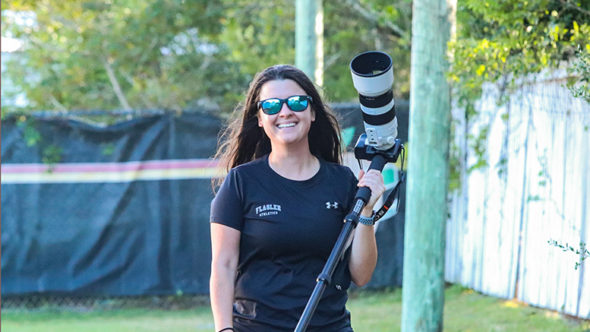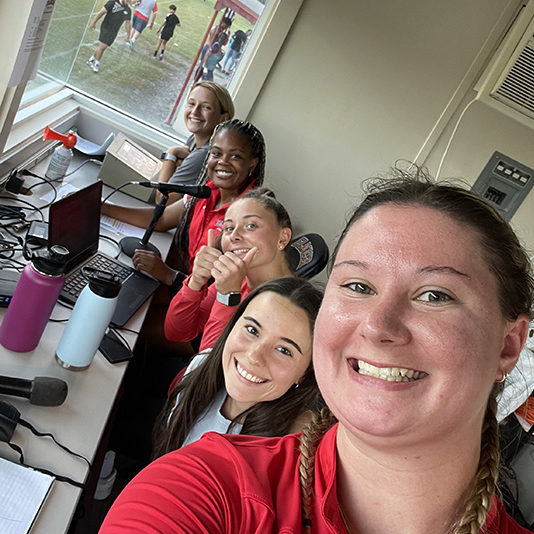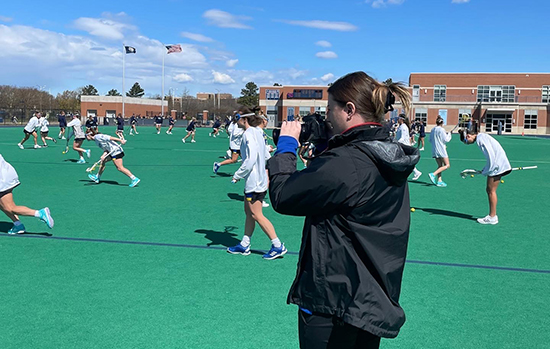By Hannah Duffey
It was a comment during an interview that always stuck with Lauren Moore. While an intern, the high school baseball coach told her, “You know, I’ve never had a woman interview me before.”
“At that moment I was like, ‘yeah, this is why I’m doing what I’m doing,’” said Moore, director of Athletics Communications at Flagler College. “It was shocking to him, I think. I could kind of tell.”
For many women like Moore, sports media — whether as a journalist or representing teams and colleges on the sports information side — has often been a tough glass ceiling to break.
“When I decided to go into sports journalism, it was not because I wanted to be a woman in sports,” she said. “At that point in time, it was not really the message. For me it was because I loved sports and I wanted to do it. I do not think I ever looked at it myself and said I’m doing this because I am a female.”

But more and more, women like Moore are making their way up the ladder in sports media and changing how people view this once male-dominated field.
The Association for Women in Sports, an organization that advocates for women in sports media, has helped more than 200 college women reach their goals in getting paid summer positions.
Even at Flagler College, the number of women working in both Athletics and communications has been growing noticeably. A look in the press box of a recent Flagler men’s soccer game against Georgia Southwestern on Sept. 7 would have found all women from the stats table to the announcer.

“If you look at the website on Flagler for Athletics (communications), my supervisor is a male and then there are three women, which is huge,” said Assistant Sports Information Director Amber Dubois. “You do not see that. You look at any other school and it is majority white male-dominated.”
Things have not always been a walk in the park for Dubois. She has had to work that much harder to make a name for herself and earn a seat at the table.
During an internship with the ACC, Dubois was in a 10-person class where there were only three females. She said seeing things like this made her work that much harder.
“They quizzed us weekly; our job was so important,” she said. “We had to know football, we had to know everything about everything about the conference. That first quiz I bombed, and they ranked us, too, and I was ranked seventh out of all 10 interns. After that week I was like, ‘that is not good enough and I want to be the best.’ Not the best female intern, but the best.”
At the end of the ACC Championship football game, they quizzed the interns once again and Dubois was crowned the intern champion because of her work and dedication.
That moment still brings joy to Dubois. Not only did she prove to herself that she could do it, but also to the people that doubted her.

The stories of Moore and Dubois mirror what a lot of women on the national level have done in recent years.
Some familiar names who helped to pave the way for females pursuing a career in sports media have shared similar experiences, even on the level that they are on.
Doris Burke, a sports announcer and analyst for the NBA, has become one of the most respected and knowledgeable people in the field of sports. But she faced adversity for years so women today could have a smoother path.
She said in a podcast interview with Mike Greenberg: “If Mike, somehow, I have made the path easier for the women who come behind me, nothing professionally I’ve done would mean more to me because I know there are women who proceeded me who carved far more difficult path than I did and it was their professionalism and their confidence that allowed me the opportunities I had.”
For women of color it can often feel like they have to run an extra mile after what already feels like a marathon to be successful in this field. Maria Taylor, sportscaster for NBC Sports, and Taylor Rooks, sportscaster and journalist, continually remind not only women, but especially women of color that the fight is never over and to always chase their dreams, no matter how hard it gets or if the road seems never ending.
Dubois’ advice for young women wanting to work in sports media is to never give up, to keep breaking barriers and to never let anyone tell you that you are not qualified.
“You have to be comfortable with being uncomfortable,” she said. “What I have learned is to make yourself a seat at the table. One of the things I always say is to make opportunities for yourself.”



Be the first to comment on "Breaking Barriers in Sports Media"